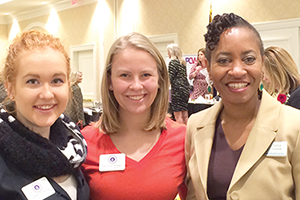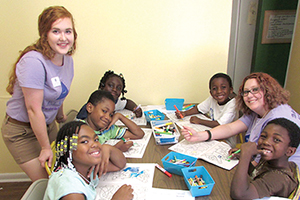By RENEE STOVSKY
Michelle Troup, 21, entered Columbia College in South Carolina certain that she was interested in a career in academic science.
A biology major from Powdersville, S.C., she is now busy studying for the Medical College Admission Test, with an eye on graduating with her Bachelor of Science this fall. Her focus has shifted to earning a dual Doctor of Medicine/Master of Public Health degree. Her change of heart, she says, is due largely to the minor in leadership studies she is earning through the P.L.A.C.E. Fellows program, a partnership between the Sisters of Charity Foundation of South Carolina and Columbia College to increase student awareness of the impact of philanthropy on community nonprofits.

Lauren Ashley Fleming, also 21, came to Columbia College in Columbia, S.C., from Spartanburg County, S.C., to study communications. When she graduates in the spring, she'll have a major in writing for print and digital media as well as three minors — in public relations, cultural anthropology and leadership studies. And while she still plans on pursuing a career in public relations, her experience in the P.L.A.C.E. program has led her to a desire to use those skills in an organization that promotes social diversity and inclusiveness.
Both students embody the mission of the P.L.A.C.E. (Philanthropy, Leadership and Community Engagement) program, says its director, Tamara Burk, an endowed professor in leadership and communications studies at Columbia. "We want to create social justice warriors who will use their powers for good," she says.
Sustainable change
Burk stresses that P.L.A.C.E. differs greatly from the service learning programs many colleges offer to students. "This is not the type of project that provides college kids with an opportunity to volunteer for a specific task and then go home and feel good about it," she says. "We are looking to build relationships and become members of a community to affect sustainable change."
Tom Keith, president of the Sisters of Charity Foundation of South Carolina, sees P.L.A.C.E. as a natural outgrowth of the foundation's mission to strategically use resources to "reduce poverty through action, advocacy and leadership."

With current assets of $98 million, the foundation — established in 1996 with 50 percent of the proceeds of the sale of Providence Hospital in Columbia — is the third largest in the state. Keith sees the P.L.A.C.E. partnership as a way to extend its initiative to teach capacity building to nonprofits by working with "next generation leaders" and schooling them to look at their community "through different lenses."
A new mold
The collaboration, begun in 2013, was nurtured by Katrina Spigner, an alumna of Columbia College, former foundation director and current director of the graduate organizational leadership program at the college. Spigner brokered a conversation between Keith, Burk and a now-retired professor, Linda Salane, to envision a way to give a select group of incoming students a deep dive into understanding philanthropy, leadership and community engagement.

"We had no best practices model on how the program would ultimately look; it has emerged and solidified over the past four years with Tamara (Burk) shaping the curriculum based on focus groups and community needs, with feedback from the foundation," says Spigner.
P.L.A.C.E. students — each cohort numbers approximately 10 — are chosen through a competitive interview process and earn, over the course of four years, a 16-hour minor in nonprofit leadership. In addition to classes that focus on women, poverty, social justice and leadership, plus two electives, each student is required to complete a senior capstone project, 10 hours of community engagement work per semester and two nonprofit internships. The paid internships are funded by the Sisters of Charity Foundation, which awards the program a $25,000 annual grant.
Lots of options
Key to the P.L.A.C.E. philosophy is the notion that students can major in any area they choose. "We are not looking specifically for social work, psychology or human services majors; we have students in the program who are political science majors, community arts and dance majors, pre-dental majors and more," says Burk. "We want them to discover and follow their passions, and then use those interests to make an impact on the community."

To that end, students also are expected to design their own internships. A political science major worked in the mayor's office, a dance major interned with a children's theater group and is now a professional member of the company, which provides artistic enrichment for disadvantaged children. P.L.A.C.E. had a communications major intern at the South Carolina Coalition Against Domestic Violence and Sexual Assault; and a pre-dental student interned at a local free dental clinic and worked with Transitions, a housing program for homeless individuals, says Burk. That student starts dental school in the fall.
For her part, Troup has spent time at Nephron Pharmaceuticals, both in the microbiology labs there and on the corporate side, shadowing its chief executive to learn how to be both a business leader and a philanthropist in the sciences. After a monthlong study abroad experience last winter along the Amazon River, where she studied food sustainability in indigenous communities, Troup is now planning another internship for the fall, researching food accessibility in Columbia.
"My P.L.A.C.E. experiences, both on and off campus, have made me realize that food sustainability is an issue of social justice," says Troup. "Now I know there are so many different avenues available to make an impact in the public health sector."
Busting through biases
Fleming spent the summer of 2016 leading a children's program at the Gable Oaks apartment complex in Columbia's Eau Claire, a predominantly black community close to campus. "It was as grassroots as you can get; we engaged the kids with reading, math and science experiments and provided lunches," she says. "It was definitely a cultural shift, and a chance for me, as well as the children, to break through barriers and build trust with each other."
She's also done a short internship with Big Brothers Big Sisters.
"I've learned that my passion is working with middle school and high school girls," she says. "I'd like to find a way to combine that with a job in communications that allows me to break down the implicit biases we all have in our society. P.L.A.C.E. has taught me that people's stories are so much bigger than our perceptions of them; we are all going to have to find a way to get along on this planet."
Scaling up
The first group of P.L.A.C.E. fellows graduated in May. The Sisters of Charity Foundation of South Carolina and Columbia College are weighing whether and how to expand the program's reach beyoond the private liberal arts women's college.

"We've had tremendous feedback in the community for the internship program, and our students have conducted a workshop at the South Carolina Association of Nonprofit Organizations and given a presentation at the National Collegiate Honors Council conference in Seattle," says Burk.
Because of that national exposure, Spigner has been fielding interest from others about replicating P.L.A.C.E. elsewhere.
"We are actually at a place where this model could be lifted and put in other places," she says. "The key, though, is having the ability to duplicate a director who embodies the core values of the foundation — compassion, courage, respect, justice and collaboration — and has imbued them into P.L.A.C.E. That's what makes this work."
Adds Keith: "We are huge cheerleaders of P.L.A.C.E." The foundation honored the first graduating class with a reception and a video recalling their four years in the program. "It's been amazing to watch the transformation of these young women, under the tutelage of a faculty member like Tamara Burk, become true advocates and crusaders for community change."
His goal for the program's further growth? "We've talked about expanding this to other colleges, but frankly, I'd like to take it to the high school level as well. We've had discussions with some Catholic school principals that I hope will come to fruition in the next year or so," he says. "We need to connect kids to their communities at an even earlier age."
Conversion foundations invest to drive systemic change By RENEE STOVSKY In 1996, the Sisters of Charity of St. Augustine set up three health care conversion foundations with 50 percent of the proceeds of partnerships involving the sales of St. Vincent Charity Medical Center in Cleveland, Ohio, Mercy Medical Center in Canton, Ohio, and Providence Hospital in Columbia, S.C. The intention of each foundation, says Sr. Judith Ann Karam, CSA, congregational leader of the Sisters of Charity of St. Augustine, is to analyze the unmet needs of the communities they serve and distribute funds through foundation-led initiatives, strategic collaborations with other nonprofit agencies and grants. "We are really trying to be about systemic change," says Sr. Karam, past president and chief executive of Sisters of Charity Health System and past chair of CHA's Board of Trustees. In Columbia, in addition to the P.L.A.C.E. Fellows program, the foundation has prioritized initiatives to reduce poverty through engaging fathers in parenting; to support the health, well-being and economic mobility of immigrant, mixed-status and refugee families; and to offer "kinship care" — financial and support services for grandparents and other relatives raising children. In Cleveland — where the foundation merged in 2006 with the Saint Ann Foundation (established in 1973 with the proceeds of the sale of St. Ann Hospital there as the first health care conversion foundation in the U.S.) — the broad focus has been on changing the trajectory of poverty in Cuyahoga County. "We have been working on issues of homelessness, health and education disparities, with special attention to the Central neighborhood of Cleveland," says Sr. Karam. In 2010, the foundation took the lead to establish the Cleveland Central Promise Neighborhood, based on the nonprofit Harlem Children's Zone model. A collaborative initiative with residents, the Cleveland school district, and other organizations and agencies, it works to ensure that young neighborhood children are school-ready, graduate from high school and go on to post-secondary education, including college, and careers. It also seeks to improve the physical assets of the area, which has some of the oldest subsidized housing in the Cleveland metropolitan region, by partnering with neighborhood development groups and others. The Canton foundation has prioritized quality child care, overseeing efforts to prepare 3- to 6-year-olds for school through a $5 million SPARK (Supporting Partnership to Assure Ready Kids) initiative grant to Stark County from the W.K. Kellogg Foundation. It also has focused, since 2001, on prescription assistance for the uninsured, underinsured and Medicaid/Medicare population to obtain needed medications. And it has concentrated on oral health by initiating the Bethlehem Project to improve access to dental care services for low-income children and their families, and by working with Mercy Medical Center to launch the hospital's general practice residency in dentistry and dental clinic, which opened in 2007. "For the last 20 years, our foundations have tried to follow our mission to heal and serve those in need," says Sr. Karam. "We know we cannot do it alone; it's essential to have the respect and participation of each community. As we work together, and as needs change, so can our responses." — RENEE STOVSKY |
